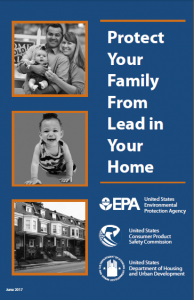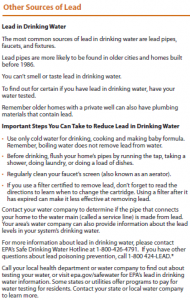Tom Neltner, J.D., is Chemicals Policy Director
In June 2017, the federal government updated the “Protect Your Family from Lead in Your Home” booklet to expand the information provided on lead in drinking water from a few lines to a full page. Since 1996, when someone rents or buys a home built before 1978, the property owner or landlord is required to provide them with a copy of this booklet. The last update to the booklet was made in 2012.
What is removed?
- Statement that paint, dust and soil are the most common sources of lead. The new version does not make the comparison. See our September 2017 blog for the Environmental Protection Agency’s (EPA) latest estimates on sources of lead exposure.
- Running water for 15 to 30 seconds before drinking. The new version is silent on length of time to flush water and instead highlights taking a shower, doing laundry, or doing a load of dishes as options to flush the line at the tap. The change was necessary because homes with lead service lines, the lead pipe that connects the main under the street to the home, often experience higher levels of lead after 30 seconds of flushing.
What background is added?
- Lead pipes, faucets and fixtures are the most common sources of lead in drinking water.
- Reminder that older homes with private wells can have lead plumbing materials too.
- Some states or utilities offer programs that pay for water testing for residents.
What are the new recommendations?

- Regularly clean your faucet screen (also known as an aerator).
- If using a filter to remove lead, follow directions to learn when to change the cartridge.
- Use only cold water to make baby formula.
- Contact your water company to determine if your home has a lead service line and to learn about lead levels in the system’s drinking water and water testing for residents.
- Call EPA’s Safe Drinking Water Hotline at 1-800-426-4791 for information about lead in drinking water and 1-800 424-LEAD for other questions about lead poisoning prevention.









